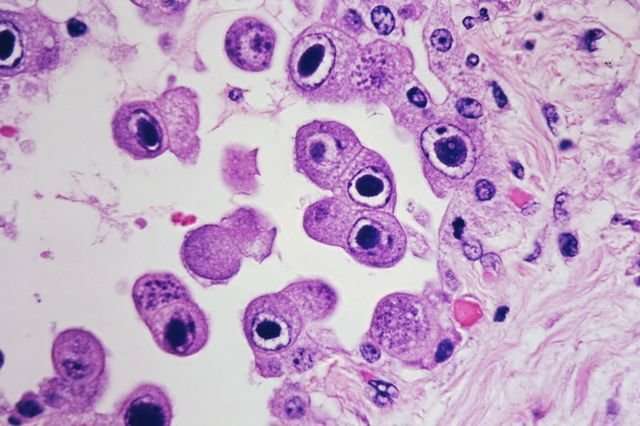HIV-positive infants are at high risk for acquiring congenital cytomegalovirus infection

Infants born to HIV-positive mothers had high rates of congenital cytomegalovirus, or CMV. Infants who also were infected before birth by the virus that causes AIDS were especially prone to CMV infection.
The researchers found that 23 percent of the infants who became infected with HIV during the mother's pregnancy also were infected with CMV; 18 percent who were infected with HIV either during pregnancy or birth acquired congenital CMV; and 4.9 percent who were exposed to HIV but remained uninfected with that virus also acquired congenital CMV.
Overall, HIV-infected infants were four times as likely to have acquired congenital cytomegalovirus infection compared to infants who were exposed to, but remained uninfected with, HIV. HIV-positive infants who were infected during the mothers' pregnancy had a sixfold or greater chance of also acquiring congenital CMV.
Cytomegalovirus infects people of all ages. People with healthy immune systems usually do not exhibit symptoms, which include fever, sore throat, fatigue, swollen glands and, in those with weakened immune systems, more serious symptoms in the eyes, lungs, liver, esophagus and intestines. But it is also an often under-recognized cause of infant disease and illness, particularly hearing loss and developmental delay. While it is known that congenital CMV infection rates may be higher in HIV-exposed and HIV-infected infants compared to the general population, less is known about comparative risks of their acquiring congenital CMV. Few studies have explored these relationships between HIV and cytomegalovirus in low- and middle-income countries, where rates of CMV and congenital CMV are believed to be higher.
The researchers analyzed data from the National Institute of Child Health and Human Development HIV Prevention Trials Network 040 Trial, which evaluated three infant antiretroviral treatments in women, who were primarily from Brazil and South Africa. The team conducted laboratory tests on 992 urine specimens that were collected at birth from HIV-exposed and HIV-infected infants. Data was then analyzed with infant cytomegalovirus results with respect to other details on maternal and infant HIV status and other circumstances that could pose a risk.
The researchers did not evaluate congenital cytomegalovirus rates in the general population because the study was restricted to mother-infant pairs previously enrolled in the National Institute of Child Health and Human Development HIV Prevention Trials Network 040 parent study. In addition, women in the parent study were only diagnosed with HIV infection at the time of labor and delivery, so these results are not applicable to HIV-infected pregnant women who are on antiretroviral treatment during pregnancy. Also, data on perinatal/postnatal cytomegalovirus infection and symptomatic congenital infection was not collected and was beyond the scope of this study.
The study highlights the importance of screening for congenital cytomegalovirus infection as part of routine care for HIV-exposed infants. This is especially important for infants born to women who are at highest risk of transmitting HIV to their infants—that is, those who are not on antiretrovirals during pregnancy. Screening for congenital cytomegalovirus is important because it can be easily missed, as many infants do not exhibit symptoms at birth and CMV can lead to conditions such as hearing loss and developmental delay.
The study is published in the Pediatric Infectious Disease Journal.
More information: Kristina Adachi et al. Congenital Cytomegalovirus and HIV Perinatal Transmission, The Pediatric Infectious Disease Journal (2018). DOI: 10.1097/INF.0000000000001975





















